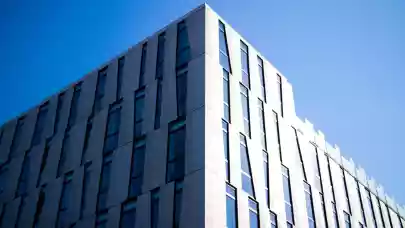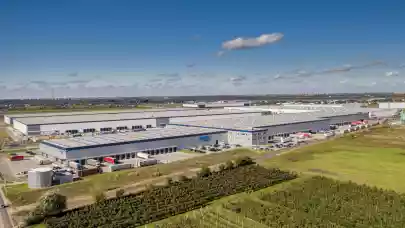
Anna Wojciechowska, Head of ESG at Robyg, talked to Property Forum about the implementation of the principles of sustainability in the Polish residential market and the factors, that will affect the ESG-related activities in the following years.
Robyg is one of the first residential developers in Poland that decided to put such a strong emphasis on the implementation of ESG solutions and you have personally been appointed to the position of director (Head of ESG, in this case) to oversee the implementation of these plans. Please tell us why the company decided to take this direction.
We perceive the ESG area as a way to build our competitive advantage and an opportunity for the Robyg Group to grow. The importance of environmental, social and corporate governance aspects will continue to increase, both for our clients and for investors and the banking sector in the context of raising capital. ESG indicators have been already an important element of a company's assessment of financial institutions. Having in mind the regulations coming into force esp. in the banking sector, this trend is bound to grow. Consumer awareness is also rising together with the change of the customers’ expectations. Although our clients do not use the term 'sustainable building', they emphasise the aspects of 'green' and 'eco-friendly' estates. They want to live in places surrounded by greenery and at the same time not incur high maintenance costs, which is precisely the advantage of low-energy buildings in line with the EU Green Deal goals. In addition, ESG is a way for us to manage risks effectively - not only environmental ones but also climate risks. It means taking into account the changing life conditions on the planet as well as the need for sustainable design and construction, which in turn is reflected in the costs and construction time. Hence, climate risk may emerge as a pivotal factor in the financial management of the Robyg Group. In terms of the increasing obligations and fast-changing legal regulations to which companies and organisations have to adapt, a good understanding of the ESG area means less risk associated with their impact on the market, e.g. technical conditions, which may be critical for cost calculation.

Anna Wojciechowska
Head of ESG
Robyg
What viable solutions to mitigate buildings’ impacts on the ecosystem is Robyg implementing in its new developments?
To reduce the impact of our buildings on the environment, we use several solutions called the Robyg Green Standard. The Robyg Green Standard is a structured standard that includes solutions and amenities for customers, as well as guidelines for architects and designers of the construction, sanitation, electrical systems or green design. In addition, the Green Standard defines several low-carbon, biodiversity-friendly and water conservation solutions. It also categorizes the requirements for their quantities in the Robyg projects. Although the Green Standard is our internal document, part of it, i.e. 16 modern, environmentally friendly solutions in flats and estates, can be found in the Finishing Standard - a formal document that is annexed to every contract concluded.
Examples of such solutions include triple-glazed windows with anti-smog ventilators, building materials that increase the airtightness of the buildings and improve external insulation, the Robyg Smart House by Keemple system, eco-friendly roofs that allow water retention, automatic motion and dusk sensors in the lighting system, or weather control in the boiler rooms that automatically adjusts the heat intake of the system to external conditions.
And what do you do when it comes to the 'S' and 'G' in this brief?
When it comes to social issues, we focus on two aspects. The first is safety on the construction sites and here we can boast very good results - no accidents among our employees. The second aspect is the gender equality issue. We have reached a balanced number of women in the management and executive positions (47%) and in the senior management alone (57%). We also monitor the pay gap at different levels of employment in our organisation, which amounts to a 2% to 3.4% gap among executives and an 8.2% gap among employees, decreasing year on year.
On the other hand, as far as the so-called corporate governance is concerned, we have set up an extensive system of internal regulations to ensure the appropriate procedures and mechanisms within our business. All our employees are trained in compliance, including prevention of mobbing and corruption. Initiatives in our value chain are also part of our effort in this area - more than 60% of our suppliers and subcontractors know and apply our Business Partner Code and Environmental Policy.
In the case of commercial real estate, ESG principles are spreading rapidly, as developers can obtain better financing terms and a higher price when selling an asset to investment funds. In the case of residential property, such advantages do not exist. Is this why many residential developers limit themselves to sham activities, such as birdhouses or bicycle racks?
ESG principles have indeed become significantly more widespread in commercial real estate, gaining rapid adoption. The impulse for change here was given by the customers themselves, while in the case of commercial properties by business. Companies were expecting better energy conditions for buildings, thereby reducing maintenance costs and having easier access to preferential loans.
For individual customers, the situation is different. Our research shows that the customer does not want to pay more for an environmentally friendly apartment. The key factor in the decision to purchase an apartment remains price, rather than future savings and environmental concerns. The monthly maintenance does not constitute such a significant portion of the household budget to choose a property based on this aspect – which is the advantage of energy-efficient building. Of course, there are already solutions on the market to encourage the purchase of homes with environmentally friendly solutions, such as green mortgages, but these are not prevalent and lack sufficient attractiveness to capture the customer's attention. The key in the housing market lies not in the law of demand, but the role of the regulator to force changes in the construction technology.
I would like to emphasise here that part of our industry is already responsibly contributing to decarbonisation with its actions. It does not use sham actions and transparently presents reliable data. Although there are not many of us in the Polish residential developer market, there are companies such as Robyg that disclose ESG data despite the lack of a legal obligation to do so. A sizable number of entities will be subject to the reporting obligations in 2025 and will undergo external attestation, i.e. an audit of non-financial data. One thing is certain - the time of sham activities in the form of bird drinkers and hedgehog houses, which, although important, are not crucial for the sector, will come to an end then.
In the face of high and ever-increasing prices, will eventually the buyers in Poland be eager to pay a higher price for flats with environmentally friendly solutions?
Prices on the market are growing dynamically, that’s a fact. However, the number of building permits has dropped significantly, with more than 20% fewer permits issued last year than in 2022. In addition, the number of land plots available for development is limited, and the processes related to issuing construction decisions significantly prolong the time it takes for new investments to hit the market. These two factors provide the main impetus for price increases.
As I’ve mentioned before, the individual customers, i.e. our target group, are not prepared to pay more for an apartment even when they know that the building is almost zero-emission and therefore cheap to maintain. The customer is primarily guided by his or her financial capabilities, including creditworthiness - most often he or she wants to buy the largest apartment within his or her budget. Low-emission and environmentally friendly solutions are 'nice to have', but do not make the customer willing to pay extra for them. Perhaps a change in buyers' attitudes will be evident if the government's energy price dials are lifted. However, I believe that in the near future, the price will still remain the decisive factor in purchasing an apartment.
As a result of rising energy prices and changes to the energy certificate regulations, will Poles start to attach more importance to the energy efficiency of the properties they own? Or is this more of a long-term process, linked to a change in social awareness, and will we only see the effects of this in many years?
All changes take time and also require proper communication. Terms such as energy efficiency need to become permanently embedded in our vocabulary and everyday life. What’s even more important is for such phrases to be understandable and explained in the language of benefits. The parameter itself, such as energy demand does not sound friendly, but information that the heating costs in this building are even 40% lower per month does.
Only a few years ago, during the discussion about photovoltaic panels or the replacement of so-called "smokestacks" (old furnaces, generating large amounts of carbon dioxide), we saw no public enthusiasm. Today, however, Poles are among the leaders in Europe when it comes to the growth of photovoltaic installations, and a large proportion of furnaces have been replaced with more environmentally friendly ones, making us breathe better, especially in cities. This shows that when we see an opportunity to live more economically, we take advantage of it. I’m convinced that introducing energy certificates for apartments, on a similar scale to the well-known certificates for washing machines or televisions, will facilitate understanding and have a positive impact on public perception. Being one of the leaders in implementing green solutions in the housing market, we see this as an opportunity to better communicate with our audience. We believe that this will accelerate the process of social change and, with the funds from the National Reconstruction Plan (KPO) for energy transformation, we anticipate witnessing this shift in the forthcoming years.



